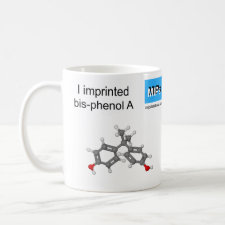
Authors: Wang XH, Chen LR, Xu XJ, Li YZ
Article Title: Synthesis of molecularly imprinted polymers via ring-opening metathesis polymerization for solid-phase extraction of bisphenol A.
Publication date: 2011
Journal: Analytical and Bioanalytical Chemistry
Volume: 401
Issue: (4)
Page numbers: 1423-1432.
DOI: 10.1007/s00216-011-5178-x
Abstract: The use of molecularly imprinted polymers (MIPs) prepared by ring-opening metathesis polymerization (ROMP) for bisphenol A (BPA) was reported in this article. The resulting MIPs have high imprinting and adsorption capacities, and can be used for separation and determination of BPA in environmental water samples. The successful application of ROMP in the molecular imprinting field is described here. For the first time, two cross-linkers (dicyclopentadiene and 2,5-norbornadiene) and two Grubbs catalysts (first and second generation) were investigated to compare their effects on the binding performance of MIPs. The ROMP technique is able to create the imprinted polymers within 1h under mild conditions. Furthermore, it can provide MIPs with obvious imprinting effects towards the template, very fast template rebinding kinetics, high binding capacity and appreciable selectivity over structurally related compounds. The adsorption process for MIPs in this study can be completed within 45min, which is much faster than that of bulk MIPs synthesized by traditional free-radical polymerization. The resulting imprinting polymer was evaluated for its use as a sorbent support in an off-line solid-phase extraction approach to recover BPA from diluted aqueous samples. The optimized extraction protocol resulted in a reliable MISPE method suitable for selective extraction and preconcentration of BPA from tap water, human urine and liquid milk samples. This article demonstrates the practical feasibility of the MIPs prepared via ROMP as solid-phase extraction materials
Template and target information: bisphenol A, BPA
Author keywords: molecular imprinted polymer, Ring-opening metathesis polymerization, Solid-phase extraction



Join the Society for Molecular Imprinting

New items RSS feed
Sign-up for e-mail updates:
Choose between receiving an occasional newsletter or more frequent e-mail alerts.
Click here to go to the sign-up page.
Is your name elemental or peptidic? Enter your name and find out by clicking either of the buttons below!
Other products you may like:
 MIPdatabase
MIPdatabase









